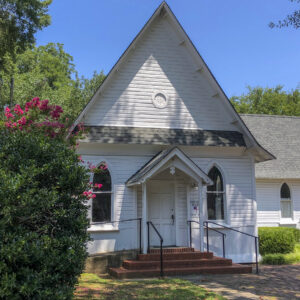J.K. Lilly and his sons, Eli and J.K. Jr., who founded Lilly Endowment in 1937, understood that for individuals and families to flourish, the communities that they call home must be vibrant places where people care about and get to know each other—places that offer appealing amenities and an overall quality of life that contribute to the abilities and opportunities of all residents to realize their potential. Such communities do not just happen. They must be persistently and intentionally nurtured. Civic engagement must be continually encouraged, and a dynamic of mutuality must be fostered and tended.
Our founders knew that a sense of place is important to the development of these community dynamics, and they sought to help cultivate a sense of place in their hometown, Indianapolis, and home state, Indiana. These places meant a great deal to the Endowment’s founders. As Eli Lilly wrote in 1974:
“All of us (Lillys) put together have never done as much for Indianapolis
as Indianapolis has done for us.”
To that end, the Endowment has supported an array of organizations in Indianapolis and in Indiana that help enhance quality of place and community, including parks, churches, arts and cultural organizations, colleges and universities, historic preservation organizations, human services and affordable housing agencies, youth development organizations, K-12 education and early learning providers, and philanthropic organizations. All these organizations and others play important roles—individually and collectively—in building a sense of place in a community and in helping residents identify with and feel connected to a given place.
This annual report features stories that portray the efforts of various organizations in Indianapolis, across Indiana and throughout the country that with support from the Endowment are purposefully building a sense of place to bolster civic connectedness and enhance quality of life and community vitality.

A story from our grantmaking in community development highlights the many ways in which parks add to the beauty and well-being of our city, state and nation—from small pocket parks within Indianapolis neighborhoods to Indiana’s beloved state parks and the wonderfully varied parks, historic sites and monuments overseen by the National Park Service. In 2024, the Endowment approved a $100 million grant to the National Park Foundation, a $50 million grant to the Indiana Department of Natural Resources to fund improvements at Prophetstown State Park and in various parks throughout the Indiana State Parks system, and a $30 million grant to the White River State Park Development Commission for a major expansion of that park in downtown Indianapolis. These grants followed $80 million in grants approved in 2022 to support new facilities and restoration efforts at more than 40 Indianapolis parks in the Indy Parks and Recreation system.
Another story from community development describes a few community foundation projects supported by the latest grants made through Phase VIII of Giving Indiana Funds for Tomorrow (GIFT), the Endowment’s decades-long initiative that encourages community foundations to work with a broad range of community residents to identify and prioritize the most compelling needs and opportunities that should be addressed to strengthen quality of life in their communities.
 From our grantmaking in religion, there are two stories that recognize the roles that congregations play in their local communities. One story highlights how, with funding from the Endowment, the Preserving Black Churches Project of the National Trust for Historic Preservation is helping historically significant churches preserve their structures to strengthen their ministries and tell their stories of resiliency and hope as carriers of African American religious and cultural traditions.
From our grantmaking in religion, there are two stories that recognize the roles that congregations play in their local communities. One story highlights how, with funding from the Endowment, the Preserving Black Churches Project of the National Trust for Historic Preservation is helping historically significant churches preserve their structures to strengthen their ministries and tell their stories of resiliency and hope as carriers of African American religious and cultural traditions.
Another story features a new Endowment initiative, Ministry in Rural Areas and Small Towns. Churches in small towns often play important roles in the history and identities of their communities by serving as gathering places for community and civic events. Many host health and wellness and early childhood education programs. Endowment grants are helping organizations work with congregations around the country to strengthen pastoral and lay leadership, enhance ministries, and build relationships with community organizations to foster the well-being of community residents.
A story about our grantmaking in education focuses on the collaborative endeavors of Indiana colleges and universities as they engaged with community residents and organizations to prioritize and address key challenges and opportunities to enhance quality of life in their communities. Through the Endowment’s competitive initiative, College and Community Collaboration, 19 Indiana colleges and universities received grants in 2023 and in 2024 to partially support their varied and community-informed projects. The annual report story highlights the collaborative efforts of three of these institutions—Ball State University, Hanover College and Rose-Hulman Institute of Technology—to enhance their communities and campuses.
After the isolation so many felt during the COVID-19 pandemic and with the increasing use of virtual means for social engagement, cultivating a sense of place where people can interact with each other and with nature in real time seems more and more compelling. It is heartening for us to see the multitudes of people who are dedicating their energies, time and other resources in collaborative efforts to improve quality of life in their communities throughout our state and country. It is a privilege for the Endowment to be able to help them along the way.
Transitions
In closing, we acknowledge with gratitude the contributions and service of two Lilly Endowment board members, Eli (Ted) Lilly II and Craig Dykstra, who became emeritus board members in 2024.
The longest-serving director in the Endowment’s history, Eli (Ted) Lilly II joined the board in 1976 when his great uncle and Endowment founder Eli Lilly was on the board. During his nearly 50-year tenure as an Endowment director, his wise and perceptive counsel contributed greatly to our deliberations as did his stewardship of our founders’ aims and values.
Craig Dykstra joined the board in 2013 after leading the Endowment’s religion division for 23 years, retiring as senior vice president for religion in 2012. Bringing to the board a generosity of spirit, sage advice and a keen understanding of and commitment to philanthropy, he had a deep concern for the vitality of pastors, congregations and theological schools throughout our country and extraordinary knowledge and insights about their strengths, challenges and potential.
We were pleased to welcome two new board members in 2024: Rebecca E. Lilly and John D. Witvliet. Lilly is a great great-granddaughter of J.K. Lilly, Jr., one of the Endowment’s founders. A native of Indianapolis, she received a bachelor’s degree from Tufts University and an MBA from the Yale School of Management and currently serves as Vice-President, Financial Advisor at Morgan Stanley in Greenwich, Conn. Effective June 1, 2025, Witvliet will serve as senior scholar and program advisor for university missional initiatives and professor of theology, worship and the arts at Belmont University. The founding director of the Calvin Institute of Christian Worship at Calvin University, he holds a master’s degree from Calvin Theological Seminary, a master’s degree in music from the University of Illinois, and a doctorate in liturgical studies and theology from the University of Notre Dame.
This year also marked the retirement of one of our long-tenured administrative assistants, Darleatha Harris. For 34 years, she was indispensable to the success of the Summer Youth Program Fund and other Endowment grant programs that promote the healthy development of youth. We will miss her hospitable spirit and irrepressible wit.

N. Clay Robbins
Chairman & Chief Executive Officer

Jennett M. Hill
President